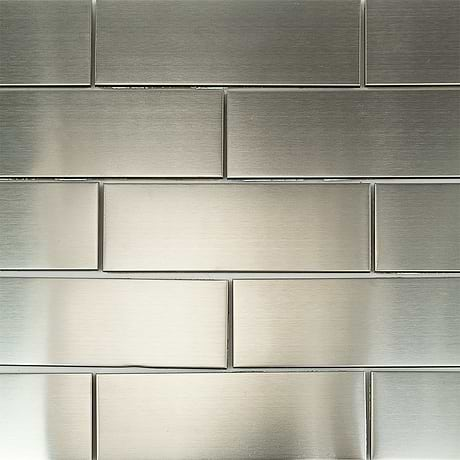FAQ
What are the uses of metal tile? 

Metal tiles find a variety of applications across different spaces. They often grace kitchens as stunning backsplashes, adding a touch of elegance while providing durability and easy maintenance against spills and splatters. In bathrooms and showers, these tiles bring a sleek, modern aesthetic, offering a hygienic surface that resists moisture and is relatively simple to clean.
Additionally, metal tiles are employed as accent pieces or decorative elements in various parts of a living space. They can be used to enhance fireplaces, adorn feature walls, or incorporate into tile patterns to introduce visual interest and a touch of sophistication. Occasionally, metal tiles designed for outdoor use find their way into patios, decks, or landscaping features, bringing an industrial or modern look to outdoor living areas.
What are metal tiles? 

Metal tiles are decorative or functional tiles made primarily from various metals like stainless steel, aluminum, copper, or brass. They come in various shapes, sizes, and finishes, offering a versatile option for interior and exterior design.
These tiles can be manufactured as solid metal pieces or as a metal coating over other materials like ceramic, glass, or porcelain. They often feature intricate designs, textures, or patterns that add visual interest to surfaces.
Metal tiles are used in various applications, including kitchen backsplashes, bathroom walls, showers, flooring, accent pieces, and even outdoor spaces. They provide a modern, sleek look and are appreciated for their durability, moisture resistance, and relatively easy maintenance.
Their versatility allows them to be incorporated into different design styles, from contemporary to industrial, adding a touch of sophistication and elegance to spaces. However, it's important to note that they may require specific care to prevent scratching, denting, or potential discoloration over time, depending on the metal used and the finish.
Is grout needed when installing metal tiles? 

Grout plays a pivotal role in the installation of metal tiles Its multifaceted functions are instrumental in securing these tiles firmly in position, ensuring their steadfastness once installed. Filling the gaps between tiles, grout creates a seamless surface, safeguarding against moisture seepage.
Beyond its practical use, grout significantly enhances the overall aesthetic of the tiled area, delivering a refined and polished appearance that complements the metal tiles’ design. When applying grout to metal tiles, choosing the right type is crucial to prevent scratching during installation.
Precision is key during the installation process to create a proper seal, guarding against potential issues like water damage or staining, especially in moisture-prone areas. Regular maintenance and periodic resealing become essential to uphold both the integrity of the grout and the enduring allure of the metal tiles over time.
Does metal tile rust? 

Metal tiles can indeed be prone to rusting, depending on the type of metal used and the conditions they're exposed to. While certain metals like stainless steel or aluminum are more resistant to rust, others such as iron or non-stainless steel can oxidize and develop rust when exposed to moisture and oxygen over time.
To prevent rust on metal tiles, it's crucial to choose the right type of metal or apply protective coatings. Stainless steel and aluminum tiles are popular choices for areas prone to moisture because they are rust-resistant. Regular maintenance, such as cleaning and applying protective coatings, can also help prolong the lifespan of metal tiles.
When addressing user concerns, highlighting the importance of choosing rust-resistant metals or protective coatings can alleviate worries about rust formation on metal tiles. Additionally, recommending proper maintenance routines can reassure users about the durability of these tiles in various environments.
Can metal backsplash be used in a kitchen? 

Metal backsplashes are a fantastic addition to a kitchen. They're resistant to heat, stains, and water, making them ideal for the kitchen environment where spills and splashes are common.
Stainless steel backsplashes provide a sleek, modern look and are exceptionally durable and easy to clean. They also pair well with various kitchen styles, from contemporary to industrial. Copper backsplashes offer a warm, inviting feel with their rich tones and unique patina that develops over time.
Aluminum and tin backsplashes are lightweight, easy to install, and can add a touch of vintage charm or modern flair to the kitchen, depending on the design chosen. Metal backsplashes are not only aesthetically pleasing but also practical, as they can protect walls from stains and damage, making them a great choice for any kitchen.




